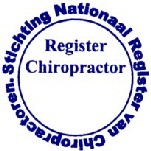A herniated intervertebral disc usually occurs in the neck or lower back. With a hernia, the nerves that run along the spine are compressed by the bulging of an intervertebral disc. There is often pain radiating to the legs. The intensity of the pain varies greatly: sometimes you feel little or no pain with a hernia, but there may also be periods when the pain is so severe that it seriously hinders your daily activities.
If you suffer from a herniated disc, you may benefit from Spinal Decompression Therapy. This therapy has produced many good results, even in patients who have already undergone various other treatments without success. Spinal Decompression Therapy aims to create more space between the vertebrae, so that the pressure on the nerve reduces or disappears.
How Can Our Chiropractor Help With a Hernia?
Many people suffer from hernias, but often do not know how to deal with them. Fortunately, our chiropractor help you relieve pain and other symptoms associated with a herniated disc. They also target the underlying cause of the hernia, which can prevent future problems. So if you are experiencing pain or other symptoms related to a herniated disc, our chiropractor can help you get your life back.
What is a hernia?
Chiropractic is an effective and safe treatment method to relieve these complaints. It is relatively new to chiropractic practice, but can be performed by experienced chiropractors. Through spinal manipulations and physiotherapy, chiropractic can be used as an additional treatment for hernia problems. Chiropractic care can also help relieve pain between acute episodes or in the long term. By focusing on deep muscle strengthening and stabilizing exercises, chiropractic care can really help with hernia treatment. The goal of chiropractic care is to relieve tension in the area surrounding the hernia, resulting in less pain and limited mobility. Knowing what a herniated disc is and how chiropractic care can help, it is important to know when to see a chiropractor for this problem.
When should I consult a chiropractor?
A chiropractor can help with hernia complaints through chiropractic treatment using corrections. This technique aims to reduce pressure on the spinal cord and related nerves responsible for pain, stiffness, numbness and other symptoms. If you experience symptoms that indicate a hernia, it is advisable to contact a chiropractor to receive treatment.
Chiropractic is a form of physical work that has been around for more than 100 years. Through manipulations and corrections, the chiropractor can open the thinner intervertebral discs and create space around the spinal cord. This reduces pressure on the spinal cord and helps relieve symptoms such as pain, stiffness, numbness or other complaints associated with hernia complaints.
Since every person is different, every treatment is also unique to each individual. A good chiropractor will look at your specific situation with you and put together a treatment plan to combat your complaints. Please feel free to contact a local chiropractor to help find the right treatment for your hernia symptoms.
Symptoms and diagnosis
Symptoms may vary depending on the condition, but may include fever, coughing, fatigue and difficulty breathing. To make the diagnosis, the doctor may perform a physical examination, X-rays, or other laboratory tests.
Hernias can cause many painful symptoms. The diagnosis is often made when abnormalities in the intervertebral disc are visible as a result of an imaging technique such as an MRI scan. If the hernia is severe enough, further damage may occur to the surrounding tissue and require medical attention. Various treatments are needed to treat a hernia and prevent further damage from occurring.
Finding the right professional to manage your hernia is essential to achieving the best possible results. Chiropractic helps treat a herniated disc through manual techniques aimed at restoring and correcting the function of the spine. Through manipulations or mobilizations and other manual techniques, a chiropractor can help with pain relief, improving range of motion and reducing neurological problems associated with a herniated disc.
By combining compound therapies with regular checkups, chiropractic offers an effective approach to treating any form of hernia. Although chiropractic techniques cannot always eliminate all symptoms, chiropractic care can help manage them until medical intervention is necessary. This combination makes chiropractic treatment for hernias truly effective in controlling and reducing pain-related symptoms associated with hernias. In this light, we will now explore the treatment methods offered by chiropractors in the treatment of hernias.
The chiropractor provides treatment therapy for various conditions and injuries, including back problems, neck pain, headaches, shoulder and knee pain, and other bone and joint disorders.
Treatments usually consist of manual techniques such as manipulation and traction manipulation, which the chiropractor uses to mobilize the joints and relieve tension in the body. The goal is to restore normal function of the joints and relieve pain. Some chiropractors also offer home exercises and nutritional advice to help alleviate your symptoms.
A chiropractor can help treat a herniated disc by using various techniques and therapies. Spinal decompression therapy is used to reduce pressure on the nerves that cause lower back pain. Chiropractic care is also effective for treating hernia-related pain. The Assen chiropractor first conducts a physical examination and neurological testing to identify problematic areas. The area is then activated with various chiropractic corrections and specific manipulative techniques. Although some people benefit immediately, the treatment may require several sessions to achieve good results.
Chiropractors can help manage pain syndromes often associated with herniated discs, such as neck and back pain. Additionally, their treatments can be effective in relieving other symptoms such as nausea, dizziness, or other discomforts that occur due to the condition. If treatment is necessary, the chiropractor may suggest simple actions first, such as heat or massage, before recommending more invasive therapies. It is important that patients follow all recommendations to improve their condition and relieve their symptoms. With proper chiropractic care, hernia patients can achieve lifelong results.
How does manipulative treatment for hernia work?
Treatment usually consists of decompression, manipulation and specific exercises. These techniques are designed to strengthen, loosen, relax and improve the muscles and joints in and around the hernia. In some patients, it can also help reduce pressure on the area around the hernia.
It's like building a house, where a solid foundation is needed to ensure everything stays dry and safe. Our chiropractor uses the same principles: manual techniques are used to help the body recover. Manipulative treatment can be an effective way to improve hernia complaints.
Treatment usually involves the use of manipulation and wedging on specific locations in the body. These blocks relieve tension and pressure that can cause pain. The chiropractor also performs various tests to identify the exact location and nature of the complaints, after which he or she can tailor the treatment to what is needed for your individual situation.
Manipulative treatment often works well in combination with other forms of therapy such as nutrition, exercise and massage. Together they can ensure that you feel better again quickly. Our chiropractor always strives to make you feel comfortable and comfortable during every treatment, resulting in truly lasting results for your hernia complaints. With the right techniques, our chiropractor can help you deal with hernia complaints in a simple, effective way.
A chiropractor asks a number of questions to confirm the diagnosis and to have a conversation with the patient. After thorough examination, the chiropractor draws up a customized treatment plan aimed at symptom relief, quality improvement and restoration of normal functions. The goal of this plan is to reduce hernia symptoms and complications and, in some cases, even lead to healing.
Chiropractic treatment focuses on improving spinal mobility and relieving dysfunction. To make an accurate diagnosis, the chiropractor performs thorough examination to determine which muscles or structures are involved in herniated discs. After thorough examination, a correction is applied to painful or unstable structures, which can then be felt by each patient. By aiming for this, manual therapy can help alleviate symptoms and complications associated with hernia conditions. This allows patients to enjoy greater mobility, flexibility and comfort in their daily activities.
Benefits of Chiropractic Treatment for Herniated Disc:
- Reduces the pain and discomfort caused by hernia.
- Helps improve spinal movements.
- Improves blood circulation and nutrition of the spine.
- Reduces inflammation and reduces pressure on the nerves.
- Improves general health and flexibility.
- Increases self-confidence and reduces anxiety and depression.
Studies show that chiropractic care can successfully treat hernias in approximately 80% of patients. A chiropractor will help keep your body in good condition, making it a great treatment for people with a herniated disc. During the diagnosis, the chiropractor will perform various diagnostic tests to determine the exact cause of the hernia. This cause is usually irritated intervertebral disc, which causes pain and other symptoms such as sensation in legs.
The chiropractor then draws up a chiropractic treatment plan according to the diagnosis, which is effective for hernia patients. The goal of the plan is to gently correct your spine, which often actually results in a reduction in symptoms and pain relief. Additionally, chiropractic techniques can be used to reduce inflammation and tension and improve your overall mobility.
The chiropractor then draws up a chiropractic treatment plan according to the diagnosis, which is effective for hernia patients. The goal of the plan is to gently correct the spine, often leading to a reduction in symptoms and pain relief. Additionally, chiropractic techniques can be used to reduce inflammation and tension and improve your overall mobility.
Spinal decompression therapy to relieve pain from a herniated disc
Chiropractic can therefore make an important contribution to relieving hernia pain. Through personal attention and a systematic chiropractic treatment process, general health can be improved and pain and discomfort reduced. To learn more about spinal decompression therapy, ask your chiropractor what exactly is involved in this type of therapy.
What is spinal decompression therapy?
Spinal decompression therapy is a form of treatment that focuses on relieving pressure on the nerves in the spine by reducing the pressure between the vertebrae. It is used to relieve pain and to reduce neurological symptoms such as tingling, loss of strength and loss of sensation. The therapy can be performed using a specially designed chair or cushion that places the patient in a relaxed position, decompressing the vertebrae.
People are already familiar with the wonderful way a chiropractor can help improve their health. Spinal decompression therapy is a minimally invasive treatment used by a chiropractor to help patients with hernia-related conditions. A hypothetical example is that of a man with severe back pain and numbness in certain areas of his body. After examination, the chiropractor concluded that spinal decompression therapy was the best treatment plan to relieve the pain and get him back on his feet.
In many cases of back pain, such as herniated discs, patients may benefit from spinal decompression therapy. However, it is important to know that there is no one-size-fits-all solution for all hernia cases; However, depending on the individual situation, spinal decompression therapy may be helpful for some people with herniated discs. The chiropractor may use a variety of techniques to help patients relieve their symptoms, including specific manipulations and alignment techniques aimed at relieving pressure in certain muscle groups or mobilizing certain parts of the body. This often achieves greater flexibility, which helps to relieve pain and discomfort.
Thus, spinal decompression therapy can be really helpful in the treatment process for hernia-related conditions – but like any form of therapy, each procedure should be specifically planned after consultation with the chiropractor to ensure that he or she knows exactly what type of treatment is needed for every patient. Massage and heat therapy may also prove useful in the management of hernias, as they work together with spinal decompression therapy to improve the health of patients.
Additional benefits of visiting our chiropractor for herniated discs include pain relief, improving spinal mobility and strengthening muscles.
It can also have a positive impact on the general sense of well-being, as the treatments have a positive impact on overall health. Additionally, the chiropractor can help prevent further injuries and ongoing pain by strengthening the muscles affected by herniated discs.
Visits to a chiropractor for a herniated disc can provide many benefits. No medication or surgery is needed to relieve symptoms, and chiropractic care can help reduce pain and prevent complications from a herniated disc. The goal of chiropractic therapy is to improve movement and function, thereby reducing pain and reducing the risk of complications from a herniated disc. In addition to relieving symptoms, chiropractic treatment can also help repair previous damage caused by improper posture or poor posture that is often associated with hernias.
The benefits that chiropractic treatment provides for herniated discs vary depending on the patient and the nature and severity of their condition. Although many patients begin to notice results after one to two sessions, it is important to have multiple sessions for lasting results. Regular visits to a chiropractor can improve a patient's quality of life if he or she suffers from a herniated disc. By making summary conclusions about chiropractic treatment for hernias, patients can better understand what to expect during their treatment.
Summary Conclusions on Chiropractic Treatment of Hernias:
Chiropractic treatment can be helpful in managing pain and functional limitations associated with herniated discs. However, it is important to remember that the effectiveness of chiropractic treatment may depend on the patient's specific factors, such as the location, type and severity of the hernia. The type of chiropractic treatment used can also affect its effectiveness. Although there is no solid evidence that chiropractic treatment is effective in treating hernias, the results obtained seem to suggest that chiropractic techniques can be helpful in relieving pain and improving quality of life.
The history of chiropractic is long and deep, as is the variety of recognized treatment methods. Chiropractors have been treating hernias effectively for a long time, with great success. Through manipulation and pressure techniques, chiropractors can relieve pain and reduce certain symptoms seen with hernias. They can also improve muscle tone by working on weaker areas in the body to make joint progress.
In addition, chiropractic treatments also help reduce the risk of complications from hernias. Through therapeutic exercises, chiropractors can teach patients how to maintain correct body posture, thereby preventing injuries and improving their overall health. They also help patients maintain flexibility and train supportive muscles, which helps reduce hernia symptoms.
All in all, chiropractic treatment can be really helpful for people with a herniated disc: it can help relieve pain, prevent complications, and improve your overall health. With the right help, you can enjoy simple activities you do every day for longer – so don't let getting some extra support stop you!
What is the difference between a hernia and another medical condition?
A hernia is a medical condition in which a piece of tissue, usually fatty tissue, protrudes through a hole or opening in the abdominal wall. Another medical condition is another condition or disease that requires medical treatment.
A hernia can be caused by a lack of strength, overexertion or injury. It is a common medical condition that may require surgery to repair. Unlike other conditions, such as muscle pain or arthritis, a hernia usually results from severe damage to the tissues in the area where the hernia is located. Chiropractors can help manage and rehabilitate hernias using manual and exercise therapies to relieve symptoms and irritations. Although they may not be directly involved in surgical treatments, they can help prevent future complications.
What other treatments are there besides chiropractic treatment for hernia?
Treating a hernia can be a complex process, requiring different approaches. Chiropractic is just one of these options, which means there are other treatments that can be helpful in dealing with a herniated disc. If you are looking for ways to treat your hernia, it is important to understand all the options available. To do this, you need to know what other treatments are available besides chiropractic treatment for herniated discs.
For starters, lifestyle changes can provide simple yet effective solutions in the case of hernias. Reducing or quitting smoking, moderating alcohol, and regular exercise can help relieve symptoms such as pain and discomfort. Changing diet can also help to relieve symptoms – for example, eating enough fiber-rich foods helps with constipation and gas that can easily lead to pain in the abdominal area. These steps can be taken alone or in combination with other methods to relieve the symptoms of a hernia.
Furthermore, healthcare professionals can advise on medication intake or physiotherapy as treatment options for hernias. Some people benefit from taking anti-inflammatory medications while others benefit from physical therapy because specific exercises will help reduce abdominal pain and discomfort. Surgical intervention may also be considered if symptoms are not resolved with conservative methods; This procedure can provide the necessary recovery for many hernia-related problems.
With all of these options, it is important that patients are properly educated about all hernia treatment options that offer various lifestyle modifications, or drug interventions, until you find the right balance in the treatment that works best for your specific situation.
What is the lifespan of a hernia?
The lifespan of a hernia is difficult to predict. There are many factors that influence the duration of a hernia, including the nature and extent of the injury, as well as medical complications. Let's look at what exactly there is to know about the lifespan of a hernia:
- What is it?
- A hernia is a prolapse or bulge of tissue that is normally kept in the body. It can occur in various organs and structures, such as the abdominal wall, esophagus or spinal cord.
- Symptoms vary depending on location, but usually include pain, swelling, and discomfort.
- Sometimes surgery may be necessary to treat the hernia.
- What affects the lifespan?
- There are many factors that influence the duration of a hernia. For example, the nature and extent of injury play an important role; the more serious the injury, the longer it may take to heal.
- Complications can also influence the recovery process. For example, if infections occur around or within the affected area, this can delay or complicate the healing process. In addition, medications can also influence how quickly you heal – some medications can help heal a hernia, while others slow it down.
It is important to keep in mind that each person responds differently to treatment and each situation is unique; some patients can recover within weeks while others require monthly therapy for their recovery process. That is why it is always advisable to talk to your doctor about what applies to you with regard to recovery time after the same diagnosis.
The lifespan of a hernia is difficult to predict. There are many factors that influence the duration of a hernia, including the nature and extent of the injury, as well as medical complications. Let's look at what exactly there is to know about the lifespan of a hernia:
- A hernia is a prolapse or bulge of tissue that is normally kept in the body. It can occur in various organs and structures, such as the abdominal wall, esophagus or spinal cord.
- Symptoms vary depending on location, but usually include pain, swelling, and discomfort.
- Sometimes surgery may be necessary to treat the hernia.
- What affects the lifespan?
- There are many factors that influence the duration of a hernia. For example, the nature and extent of injury play an important role; the more serious the injury, the longer it may take to heal.
- Complications can also influence the recovery process. For example, if infections occur around or within the affected area, this can delay or complicate the healing process. In addition, medications can also influence how quickly you heal – some medications can help heal a hernia, while others slow it down.
It is important to keep in mind that each person responds differently to treatment and each situation is unique; some patients can recover within weeks while others require months of therapy for their recovery process. That is why it is always advisable to talk to your doctor about what applies to you with regard to recovery time after the same diagnosis.
Can visiting a chiropractor help prevent a hernia?
Visiting a chiropractor can help prevent herniated discs. Research shows that chiropractic care can be effective in preventing this condition. Chiropractors can help patients relieve symptoms and reduce pain. They work by manipulating the muscles and joints in the body to improve mobility. Their experience and expertise allow them to offer targeted treatments aimed at a specific problem, such as hernia or other back conditions. They can also provide advice on how to adjust your daily activity level to prevent recurrence. Treatment by a chiropractor usually consists of several sessions that help the patient reduce their symptoms and strengthen their overall physical health. They can also provide lifestyle tips to prevent future complications so that patients stay in good health for longer. To ensure that a chiropractor can help you properly, it is important that you see someone who specializes in treating back conditions, such as hernias.
Conclusion
The lifespan of a hernia can vary depending on its severity and location. It is important to know that chiropractic treatment is not always the answer to preventing or treating a herniated disc. However, if your doctor has decided with you that chiropractic treatment is an option for you, it can help reduce the pain and stiffness associated with a herniated disc.
Chiropractic is a safe and effective way to treat many pain conditions, including hernias. Although there is no drug that can cure or prevent a herniated disc, chiropractic care can be helpful in supporting other treatments such as medication or physical therapy. The chiropractor can also provide advice on lifestyle adjustments that can help prevent hernias in the future.
If you are experiencing pain from a herniated disc, remember to consult your doctor before seeing a chiropractor. Together you can determine whether chiropractic care is right for you. If you have already started treatment using manipulative techniques, stay alert for possible changes in symptoms and contact your doctor if you notice anything strange.
The lifespan of a hernia can vary depending on its severity and location. It is important to know that chiropractic treatment is not always the answer to preventing or treating a herniated disc. However, if your doctor has decided with you that chiropractic treatment is an option for you, it can help reduce the pain and stiffness associated with a herniated disc.





